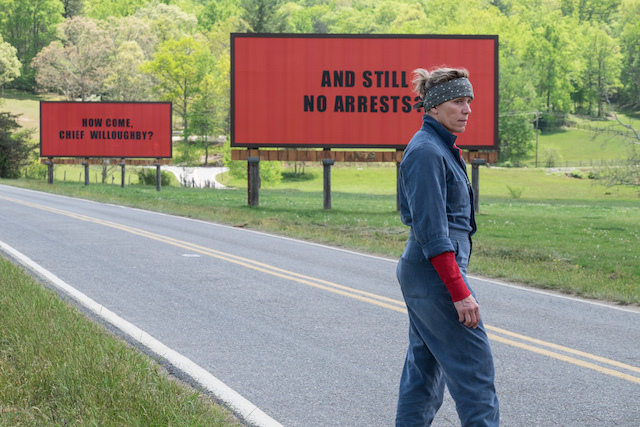
Martin McDonagh’s Three Billboards Outside Ebbing, Missouri reveals its peculiar sensibilities almost right out of the gate. Our righteously angry hero, Mildred Hayes (Frances McDormand) storms into the office of the town ad agency, inquiring about renting three consecutive billboards on a small stretch of dirt road near the police station. Her fury is barely contained as she asks the manager, Red Welby (Caleb Landry Jones), what words you can and can’t use on a billboard. “I assume you can’t say nothing defamatory and you can’t say—” at this point, she rattles off a list of expletives that would make George Carlin blush. “Or, uh, anus?” Red adds, helpfully. “We should be good then,” Mildred says. Suddenly, Red realizes who she is: “You’re Angela Hayes’ mom,” he says solemnly. In a town as small as Ebbing, everyone knows what this means: Mildred’s daughter had been raped and murdered seven months ago and, thus far, no arrests have been made and the trail has gone cold.
Watching this scene, we see that Mildred is so angry at the injustice on behalf of her daughter that she’s essentially one big coiled fist. And then she does something curious: She sees an upside down beetle in the sill of Red’s window—its tiny legs furiously pumping the air—and flips it over, thus setting it free. Despite her anger, this is a decent woman, the film is telling us—a person who cares.
In that moment, I thought the gesture—as written by McDonagh, that is—was sweet, a nice way of assuring us that no matter how cruelly and brutally she might behave in her quest for justice, Mildred is someone worth rooting for. But as the film went on, I saw that this was its shtick, if you will: Vicious violence, venal people, and profane language followed by unexpected moments of sweetness and grace. To me, misanthropy and sentimentality make for strange bedfellows. Your mileage may vary.
The billboards that Mildred eventually puts up—in large black print against a blood-red backdrop—are calling out the town’s police chief, Willoughby (Woody Harrelson) for letting the case go unsolved. He goes to visit Mildred at home and we see that he’s a decent man, who is upset about the case, too. (The film, however, never explains why he has a wife half his age who is also British.) Then he tells Mildred something that he thinks will compel her to take down the billboards—he has pancreatic cancer and is dying. Clearly he doesn’t know Mildred. “Everybody is dying,” she replies with a shrug. When it comes to this case, she has no mercy.
As angry as Willoughby is about the billboards, he also understands a mother’s grief. It’s his deputy, Dixon (a convincingly sleazy Sam Rockwell), who is inflamed with rage. Dixon we find out, is a racist dimwit who has tortured innocent black men and who lives at home with his merciless mother (Sandy Martin). He embarks on a one-man mission to destroy the billboards.
Dixon’s racism—and the racism of police in general—is brought up a lot. “You’re too busy torturing black folks to solve actual crimes,” Mildred spits out at one point. It’s a line meant to evoke approving, “You go girls” from the audience, but the film comes dangerously close to trafficking in “hipster racism” in my mind. At one point Mildred uses the “n-word,” and although she just does it to provoke Dixon, it felt sour in my ears. And then, as has been widely discussed on social media, Dixon is given a redemption arc. Indeed, he’s the embodiment of the film’s murky morality: Is Dixon a disgusting person (yes!) or a man deserving of forgiveness (that too!). The film vacillates between mocking and deriding people and propping them up.
That being said, Three Billboards Outside Ebbing, Missouri has stuff to recommend—most significantly, McDormand’s brutally funny, sad, and fearless performance. Of course, balancing rage and salt-of-the-earth decency is sort of McDormand’s thing—years of Coen Brothers collaborations has honed that skill, no doubt—but she’s just so damn good at it. A scene where she switches from barking at Willoughby to sweetly tending to his health is remarkable; as is a half hopeful, half pessimistic encounter with a deer who may or may not be the reincarnation of Angela.
Despite my reservations, Three Billboards Outside of Ebbing, Missouri is certainly memorably clever and boldly conceived. And any film that allows McDormand to strut her to stuff to this degree can’t be all bad.
